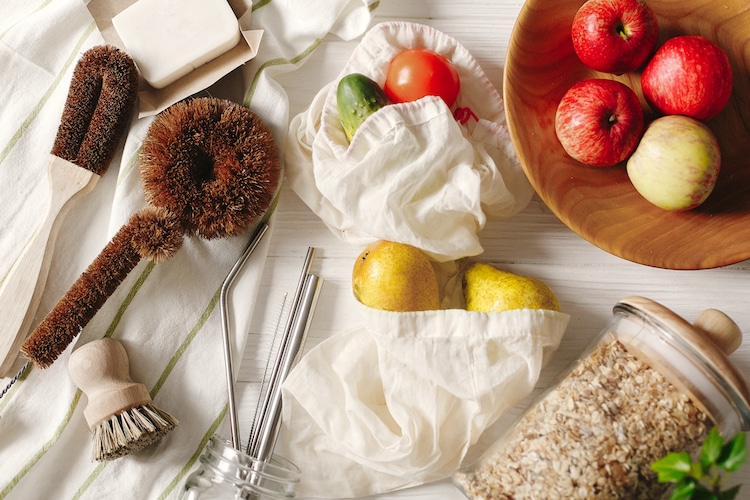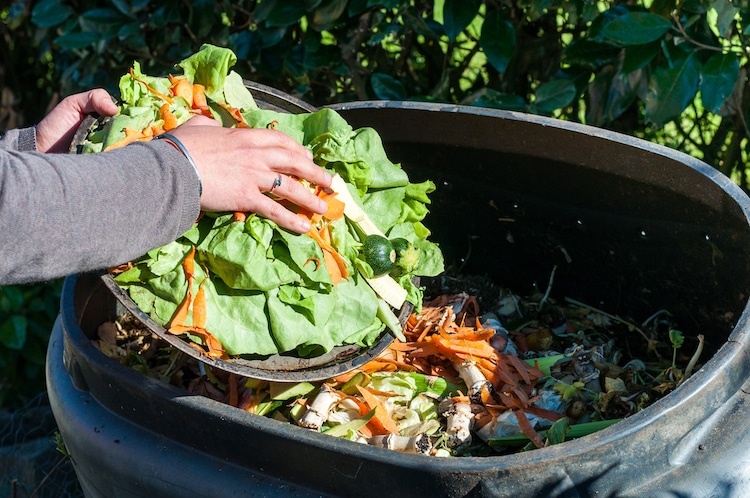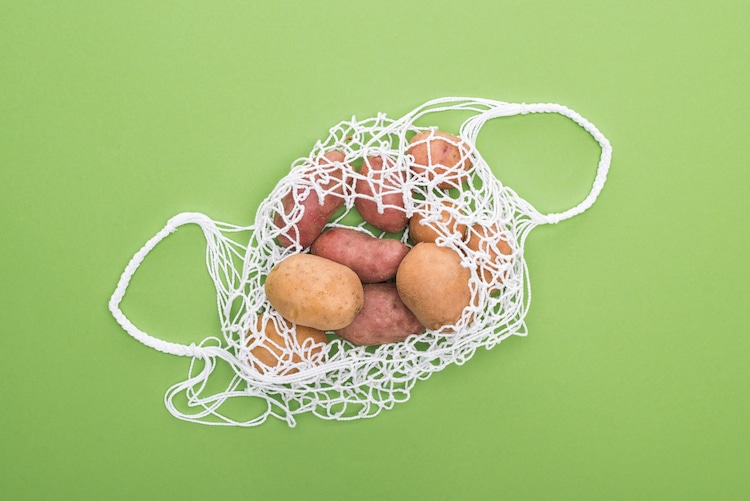
Photo: lgishevamaria/Depositphotos
This post may contain affiliate links. If you make a purchase, My Modern Met may earn an affiliate commission. Please read our disclosure for more info.
The climate crisis affects everyone, and we all need to do our part to help mitigate the detrimental effects it’s having on our planet. While many of the solutions lie in the hands of governments and public policy reform, there are things that we, as individuals, can do to lessen our negative impact on the environment. One of the things we can all strive for is to live a zero-waste lifestyle.
So, what is zero waste? It’s the practice of reducing the amount of waste you produce in your daily life to nothing. (Imagine throwing nothing away.) Being zero waste is great for the environment, especially as landfills are full and it’s becoming increasingly difficult to find new places to dispose of our trash. By reducing the amount of waste we produce, we help conserve resources and reduce pollution.
Opting for zero waste is also great for your wallet. Choosing reusable items over disposable ones often has a larger up-front cost but will save you money over time. A reusable water bottle, for example, is more expensive than a single bottle of water. But, when you think about how many bottles of water you won’t have to buy in the future, it adds up.
If the idea of zero waste is intimidating, that’s okay! Don’t let it dissuade you from even trying in the first place. It’s extremely difficult, especially in our culture of mass consumption, to live without making waste; disposable plastics and convenience items are everywhere you turn. Going zero waste isn’t about being perfect, but rather making small changes that add up over time.
To get started, scroll down for some tips for zero-waste living.
Zero waste is the practice of reducing the amount of waste you produce in your daily life to nothing. Here are 13 tips to help you get started.

Photo: Sonyachny/Depositphotos
Reduce your overall consumption.
One of the best ways to reduce waste is by simply consuming less. The solution seems obvious, but it’s easier said than done—especially in a culture that is focused on having the latest and greatest things. To help combat this mindset, be conscious of what you buy (tracking them is helpful), and try to only buy the things that you really need.
Make the switch to a reusable water bottle.
Did you know that hardly any plastic is recycled? Ditch the plastic water bottles and invest in a high-quality reusable bottle instead.
Bring your own shopping bags.
Grab your grocery totes when you do your food shopping or go on a Target run. You’ll avoid using single-use plastic bags, and in some places, avoid a small bag fee. To make your shopping even greener, refrain from using plastic produce bags and use reusable produce bags (or skip the bag completely).
Say no to plastic straws.
Ask yourself: do you really need the straw? If you can skip it, consider doing so. Alternatively, invest in a reusable straw that’s made from bamboo, stainless steel, or even glass.
Switch to cloth in your kitchen.
Rather than using disposable paper napkins or paper towels for cleaning, switch to cloth for both jobs. They can be washed and reused time and again. One easy way to make your own cleaning cloths is to cut up an old t-shirt. They make great rags, and you’re avoiding throwing something in the landfill.
Shop the bulk section.
Have you passed by bins of grains and nuts at your grocery store? That’s the bulk section. There, you can get exactly the amount of something you need which helps reduce food waste. Bring your own reusable containers to these sections to save the plastic packaging you’d likely get from the store shelves.

Photo: Pixavrill/Depositphotos
Compost your food waste.
Your city might have compost services. In that case, take advantage of them. You’d be surprised how much you can compost in commercial facilities. But if you live somewhere that doesn’t offer composting, you can create your own pile or bin to reduce food waste and create nutrient-rich soil for your plants.
Bring reusable cups to the coffee shop.
A typical single-use to-go cup you get at the coffee shop has to go into the trash; the poly-lined products aren’t recyclable. To avoid the landfill, bring your own reusable coffee cup. Hot beverages are the most common but don’t forget about your iced coffee, too.
Repair and reuse.
Instead of throwing things away, try to repair them or find ways to reuse them. If you’re weary of repairing something, check out if there’s a repair cafe in your area. You might just get that toaster working again.
Opt for secondhand.
When shopping for clothing or other items, check out secondhand stores or online marketplaces to find gently used things. Buy Nothing is another option. This form of mutual aid doesn’t cost you anything; it’s powered by your local neighborhood, and people offer the things they want to get rid of or ask for the things they need. By joining it, you’ll be keeping an item from being thrown out and you’ll have something brand new to you—all at no cost.
Use a bar of soap.
Swap out your body wash and liquid hand soap for bars of soap. This will avoid plastic bottles and you’ll still enjoy some wonderful scents.
Create ecobricks using your plastic waste.
An ecobrick is a way to keep plastic out of the biosphere; essentially, it’s a PET plastic bottle that’s filled with condensed plastic that you’re unable to recycle. It has many uses, including in building in the place of conventional bricks.
Avoid single-use plastics in your kitchen.
Refrain from using single-use plastics like plastic wrap, ziplock bags, and disposable cutlery. Swap them with beeswax wraps, silicone storage bags, and metal flatware.

Photo: VladimVasenin/Depositphotos
Related Articles:
25 Eco-Friendly Products to Reduce Waste in Style
‘Old Me vs. New Me’ Meme Offers Valuable Tips for Eco-Friendly Living
Eco-Friendly Bars in Italy Are Using Pasta Straws to Help Reduce Plastic Waste
